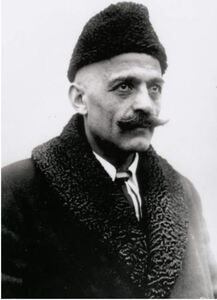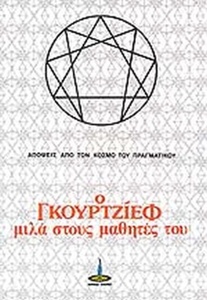George Gurdjieff

Gurdjieff was born in 1866 (?) in Alexandropol of Caucasus Pontus to Greek parents (Ioannis Georgiadis and Evdokia Eleftheriadis). His life was episodic. In his youth, after having spent time studying medicine, he wandered in the Middle and Far East for twenty whole years, reaching monasteries and holy places inaccessible to the Western traveller. There he met spiritual teachers from different religious traditions. Upon his return to the West, before World War I, students gathered around him in Moscow and St. Petersburg. With the Russian Revolution he left Russia and continued his work traveling to Tbilisi, Istanbul, Berlin and London. In 1922 he settled in the Chateau de Prairie, near Paris, where he was discreetly approached by a large number of students from all over the world. He died in 1949 in Paris.
Gurdjieff is a philosopher in the old sense, in the way that Plato and Pythagoras were. He gave substance to a multitude of great ideas, creating a philosophical approach to life that seems to meet the need of modern man to understand both the eastern and ways of describing reality, both the conclusions of modern science and wisdom of ancient tradition. The main axis of his thinking is addressed to the possibility that one can “work on oneself” to develop Consciousness, that is, develop the way one understands him/herself and the reality around him/her.
For Gurdjieff, mindful practice is the beginning and the end of all possible action. Many words are unnecessary, even suspicious. “I teach,” he declared teasingly, “that when it rains, the streets are wet.” The practice he proposes focuses on continuous baptism in experience, with the aim of understanding the truth about oneself. Nevertheless, in actuality this proves to be not as easy as it may sound.
Beside his insistence on practice, Gurdjieff provided a complete, rigorous scientific picture of how the human Brain and Mind work, which was described by Jung’s student Maurice Nicoll as the “most comprehensive picture of human psychology that was ever presented”. His ideas shocked the French philosopher Phillip Mairet to such an extent that, without being his student, he declared that “no system of philosophy from what has been published in the modern world can be compared in strength and complete articulation to Gurdjieff’s thought.” Many believe that his ideas will thus contribute to the emergence of a new way of thinking, which seems to be so much needed. The difficulty to implement this is that his teaching loses its meaning if it is not accompanied by the rigorous practice of “working on oneself”. It is most difficult to see beyond the collective fantasies of our society, which, invertedly, seem to erode every new generation of the usual theoretical well-wishers.
According to Gurdjieff, what is “sacred” is here, it is within our world, within our very material universe. His work goes to great depth, connecting the laws of the universe with observations on the anatomy of the human body and psychology. His ideas are a philosophical model perfectly compatible with today’s science while, at the same time, in some areas, it goes much further than that. It is a comprehensive view of the world that not only does not exclude but, on the contrary, strongly emphasizes the need for the dimension of spiritual practice in our daily lives.
Ultimately, his great contribution perhaps lies in the fact that he showed that the spiritual and the scientific views of the world, not only should they not compete with each other, but that they are both necessary to give a meaningful answer to the question “who am I?” and “what is it that I have to do in life?”
“Without self-knowledge, without understanding the working and functions of his machine, man cannot be free, he cannot govern himself and he will always remain a slave.”


.jpg)
.jpg)
.jpg)
.jpg)
%20(1).jpg)
